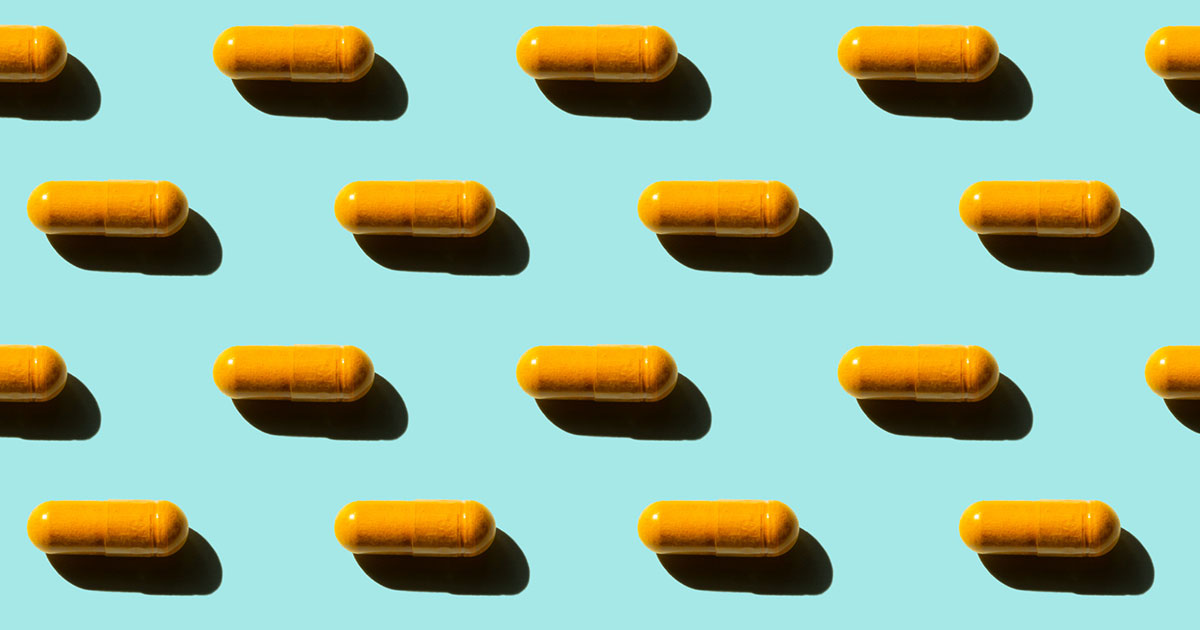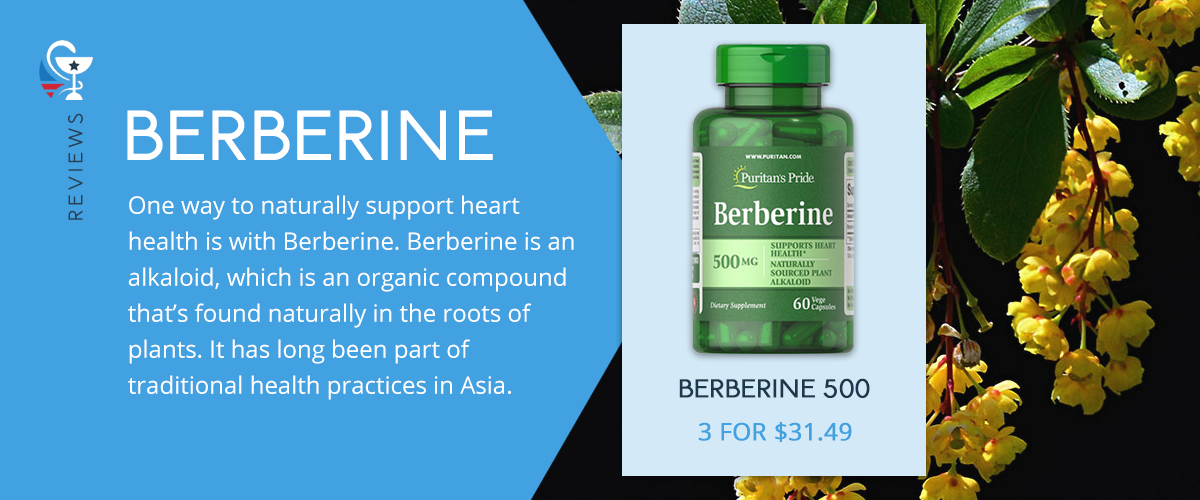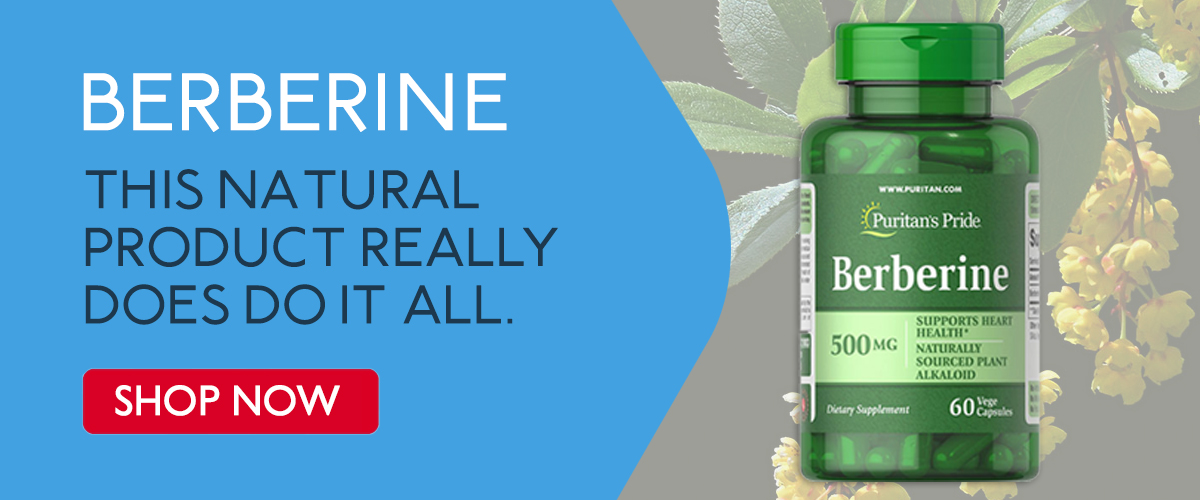
If you’ve recently looked into improving your overall health and wellness, you know that there are countless over-the-counter supplements available that offer a wide variety of health benefits. Of those, berberine supplements continue to grow significantly in popularity.
Berberine has long been used in traditional medicine, but recently, consumers have realized the potential benefits achievable for serious health concerns such as diabetes, heart disease, obesity, and cancer. As the scientific community continues to learn more about the effects an individual can experience by adding regular berberine supplements to their daily routine, we could see advancements in cholesterol and blood sugar modulation, as well as weight loss. Before you decide to begin taking berberine supplements, however, it is crucial to learn more about what berberine is and how a supplement could help you.
What Is Berberine?

Berberine is a naturally occurring chemical found in certain plants, such as barberry, goldenseal, goldthread, philodendron tree, and turmeric.[1]Och, A., Podgórski, R., & Nowak, R. (2020). Biological Activity of Berberine—A Summary Update. Toxins, 12(11), 713. MDPI AG. Retrieved from http://dx.doi.org/10.3390/toxins12110713 It is bitter tasting and yellow in color. While its use as a supplement has grown in popularity in recent years, berberine has long been used for its medicinal purposes. For example, traditional Chinese medicine used berberine to address a multitude of medical concerns. In the modern era, berberine is most commonly used to regulate symptoms of diabetes, high cholesterol, and high blood pressure. Its potential to aid in weight loss has also helped berberine become a popular option for a natural weight control supplement.
Berberine is often ingested orally in a capsule or a powder mix. It moves into the bloodstream via the digestive system before making its way into the cells of the body. Berberine binds to molecular targets, altering their function, which can alter the way the body responds to certain health concerns. Berberine also activates an enzyme known as AMP, which is often referred to as the metabolic master switch. This enzyme is found in several different organs including the brain, heart, liver, kidneys, and muscles, and plays a major role in regulating metabolism.
Berberine Benefits
The list of berberine’s potential benefits continues to grow each year as new berberine studies are conducted. Currently, berberine supplements have demonstrated the following benefits.
Berberine May Help Lower Blood Sugar Levels
Type 2 diabetes is a serious disease that affects millions of people every year. In fact, adult diabetes is expected to impact 439 million people by 2030 as obesity rates continue to rise[2]Lascar, N., Brown, J., Pattison, H., Barnett, A. H., Bailey, C. J., & Bellary, S. (2018). Type 2 diabetes in adolescents and young adults. The Lancet Diabetes & endocrinology, 6(1), 69-80.. Type 2 diabetes occurs when an individual has elevated blood sugar levels due to the body’s inability to use insulin properly. Eventually, the body can develop a resistance to insulin or experience an insulin imbalance. This imbalance can cause damage to the body’s organs and tissues over time and can lead to several different health problems as well as contribute to a shorter lifespan.
Recent studies indicate that berberine can drastically decrease blood sugar levels in individuals with Type 2 diabetes. Berberine has been shown to aid in decreasing insulin resistance, making insulin more effective. Berberine can also increase glycolysis, which helps the body break down sugars inside cells. This natural supplement can also help decrease the production of sugar in the liver and slow down carbohydrates breaking down in the gut.[3]Wang, Y., Yan, A., Li, S., Liu, B., Li, H., & Yan, Y. (2019). Efficacy and safety of berberine in the treatment of type 2 diabetes with insulin resistance: Protocol for a systematic review. … Continue reading
Type 2 diabetes is a serious medical concern that physicians recommend medication and insulin to manage once it reaches an advanced stage. Unfortunately, insulin can be expensive, especially for those without health insurance. However, for some people, type 2 diabetes can be managed and even overcome early on with proper eating and exercise that promotes a healthy weight—perhaps before insulin therapy becomes necessary. Berberine may further help people with diabetes by combatting the effects of diabetes on a molecular level.
Berberine May Help Support Healthy Weight Loss
Obesity is a chronic disease that is characterized by abnormal fat accumulation that can significantly impact a person’s health.[4]Upadhyay, J., Farr, O., Perakakis, N., Ghaly, W., & Mantzoros, C. (2018). Obesity is a disease. Medical Clinics, 102(1), 13-33. Unfortunately, obesity is rapidly growing more prevalent in the United States and has become a global concern. Hormonal, genetic, environmental, and lifestyle factors can contribute to obesity, and it can trigger other significant health concerns including Type 2 diabetes, respiratory disorders, infertility, cardiovascular disease, cancers, and more.
To combat these health concerns, many people seek to lose weight. One of the keys to lasting weight loss is capitalizing on the role of hormones that regulate fat, like insulin, adiponectin, and leptin. As mentioned earlier, berberine appears to help these hormones prevent fat cells from growing at the molecular level. In this way, berberine supplements aid in controlling the metabolic rate, which plays a huge role in the success of any weight-loss routine.
When coupled with lifestyle changes, such as eating healthier foods and committing to routine physical activity, berberine supplements can be a great way to further support healthy weight loss. Berberine weight loss reviews have shown promising results.[5]Ilyas, Z., Perna, S., Al-Thawadi, S., Alalwan, T. A., Riva, A., Petrangolini, G., … & Rondanelli, M. (2020). The effect of Berberine on weight loss to prevent obesity: A systematic review. … Continue reading Individuals who use berberine to aid in weight loss report feeling fuller longer and feeling energized throughout the day. A healthy lifestyle—and especially overcoming obesity—can help reduce or eliminate other health concerns. With the additional benefits of lower blood sugar and cholesterol levels, achieving a healthier lifestyle can be much easier with berberine supplements.
Suggested reading: Top Three Workout Routines You Can Do at Home for Weight Loss
Berberine May Help Reduce Your Risk of Heart Disease
Heart disease is one of the world’s most common causes of premature death.[6]World Health Organization. (2020) The top 10 causes of death. Retrieved March 16, 2022, from https://www.who.int/news-room/fact-sheets/detail/the-top-10-causes-of-death High cholesterol plays a large role in overall heart health; the condition causes fatty deposits to build up in the bloodstream, which can create clogs over time. This can significantly impact the way blood flows to your heart and through your body.
Drugs such as statins are commonly used to treat high cholesterol and other heart risk factors. Before the onset of heart disease, however, you can exercise prevention by maintaining a healthy lifestyle. Berberine could be a safer, natural alternative to these medications to lower cholesterol and support a healthy heart.
Studies continue to show that berberine may help address high cholesterol levels, effectively reducing your risk of heart disease.[7]Fatahian, A., Haftcheshmeh, S. M., Azhdari, S., Farshchi, H. K., Nikfar, B., & Momtazi-Borojeni, A. A. (2020). Promising anti-atherosclerotic effect of berberine: evidence from in vitro, in vivo, … Continue reading In addition, evidence supports other cardiovascular benefits of taking berberine, including protection from heart failure, hypertension, hyperlipidemia, and more. Berberine increases the concentration of calcium in cardiac muscle cells and can help regulate blood pressure by dilating blood vessels and decreasing blood pressure.[8]Cai, Y., Xin, Q., Lu, J., Miao, Y., Lin, Q., Cong, W., & Chen, K. (2021). A New Therapeutic Candidate for Cardiovascular Diseases: Berberine. Frontiers in Pharmacology, 12, 340.
Berberine May Help You Address Gut Health
Berberine appears to combat harmful bacteria in the gut, providing the means for healthy bacteria to flourish.[9]Yang, S., Li, D., Yu, Z., Li, Y., & Wu, M. (2021). Multi-pharmacology of Berberine in Atherosclerosis and Metabolic Diseases: Potential Contribution of Gut Microbiota. Frontiers in Pharmacology, … Continue reading Berberine may also help with intestinal health by prolonging the amount of time food stays in the intestines. This can help reduce symptoms of irritable bowel syndrome, providing relief from abdominal pain. Bacterial infections could also be treated with the regular use of berberine. Berberine could be used as an effective antimicrobial agent by inhibiting the growth of staphylococcus, a bacterium that can cause health problems such as pneumonia, sepsis, meningitis, and a variety of skin conditions.
Berberine Could Benefit Those With Polycystic Ovary Syndrome
Berberine has been found to provide several different health benefits for women dealing with Polycystic Ovary Syndrome (PCOS).[10]Rondanelli, M., Infantino, V., Riva, A., Petrangolini, G., Faliva, M. A., Peroni, G., … & Perna, S. (2020). Polycystic ovary syndrome management: a review of the possible amazing role of … Continue reading PCOS is characterized by a hormonal and metabolic imbalance that can lead to infertility and other serious health concerns. Many issues associated with PCOS can be relieved by berberine, including high levels of insulin, high blood pressure, high cholesterol, and unexplained weight gain. PCOS can also cause an increase in testosterone, which can cause frontal hair loss, hair growth on the upper lip and body, and acne. The relationship between berberine and testosterone continues to be studied, but early results indicate that berberine could lower testosterone levels, helping to prevent these unwanted side effects.
Cancer
Berberine can create changes within molecules of cells that can help fight cancer. It can help treat cancer by interfering with cancer’s ability to progress through its typical life cycle. In a recent study published in The Lancet Gastroenterology and Hepatology, researchers noted a significant reduction in colorectal polyps in berberine users versus a control group. This study helped show that berberine could be effective in reducing the risk of certain types of cancer.[11] Chen, Y. X., Gao, Q. Y., Zou, T. H., Wang, B. M., Liu, S. D., Sheng, J. Q., Ren, J. L., Zou, X. P., Liu, Z. J., Song, Y. Y., Xiao, B., Sun, X. M., Dou, X. T., Cao, H. L., Yang, X. N., Li, N., Kang, … Continue reading Further research is still necessary, but this provides a hopeful outlook that berberine could be used as a low-cost and safe option for preventing cancer.
Potential Side Effects of Berberine
Natural supplements affect everyone differently. Berberine is generally well-tolerated, but it is important to be aware of the potential side effects it may cause.
These include:
- Headaches
- Nausea
- Gas
- Constipation
- Diarrhea
- Stomach cramps
Most side effects experienced involve the digestive tract and are fairly minor. However, it is important to be mindful of your recommended dose, and only take as much berberine as is recommended for your age, size, and lifestyle. Too much berberine is suspected to have led to the majority of the side effects listed above. It is also important to note that it is advised that berberine not be used by women who are pregnant or breastfeeding.
What Is the Best Form of Berberine?
Berberine extract is available in powder and capsule form. Your personal preference will determine which method of delivery would work best for you, but many people choose the convenience and accurate dosage of a capsule. It is important to note that berberine supplements often include other botanicals and herbs aimed at treating a given condition, such as lowering cholesterol or aiding in weight loss. Finding the right combination for you will ultimately depend on the medical conditions you wish to treat.
Most providers recommend 900-1500 mg/day of berberine, and most individuals choose to take 500 mg capsules three times a day. This can provide the best results since berberine metabolizes very quickly. Due to berberine’s fast rate of metabolization, taking berberine at predetermined time intervals is more effective than trying to take a full day’s dose at once. Whichever dosage or method of delivery you choose, take the berberine supplement right before eating, with your meal, or immediately after eating. This is the best time to achieve an ideal reduction in blood sugar levels.
Please note that some individuals will experience health benefits much sooner than others. It is recommended to wait at least 3-4 weeks before assessing the results you receive from your berberine supplement.
Best Berberine Supplement
When it comes to quality berberine supplements, there are a number of options on the market. Of these, there are a select group of berberine supplements you can buy with confidence. When deciding on the best product for you, it can be best to speak with an experienced pharmacist. Sources like Compounding Pharmacy of America have professionals on hand who can answer any questions and address your concerns.
Here are some berberine supplements to consider:
Berberine 500
Berberine 500 is designed to help users maintain a healthy respiratory tract as well as a balanced GI system. This can help with the production of beneficial bacteria that support healthy weight loss and weight management. This product contains all-natural ingredients with no added colors or flavors. It is also soy-free, gluten-free, and dairy-free.
Where to buy
Berberine HCL
This berberine supplement was initially formulated to support healthy blood sugar levels. It is available in goldenseal, Oregon grape, barberry, and golden thread. Berberine HCL can be taken orally or used as a topical product that gets rubbed into the skin. This supplement is designed to promote heart, vision, and bone health, as well as support liver function and aid in digestion.
Berberine Root Extract
This supplement was also created to lower blood sugar levels. Berberine root extract is non-GMO and vegan friendly. In addition to helping control blood sugar levels, it also helps improve cardiovascular health, arthritis, and promotes an overall healthy lifestyle. Some consumers have even experienced relief from menstrual cramps and other symptoms.
Sunergetic
This berberine supplement is produced in an FDA-registered facility, made with premium quality ingredients, and is vegetarian-friendly. This supplement stands out from the rest by the 600mg dosage capsule which is one of the highest available. Sunergetic supports healthy blood sugar levels as well as cardiovascular health. It is important to note that this product is not meant for long-term use.
Berberine Pure
This supplement is also produced in an FDA-regulated facility and made with clinically proven, all-natural ingredients. It is non-GMO and gluten-free. Berberine Pure can help with high cholesterol as well as metabolism. It is beneficial to note that results could take up to 90 days.
Adding Berberine Supplement to Your Routine
It is clear why berberine has been used as a traditional medicinal ingredient for centuries. In the modern day, Berberine continues to show promising results in the laboratory, aiding in the treatment of significant medical concerns such as diabetes, obesity, heart disease, and more. Berberine supplements offer a natural alternative to prescription medicine or can serve as a companion to essential medications. Best of all, most users report few, relatively mild side effects.
Chief Operating Officer, The Compounding Pharmacy of America
Matthew Poteet, Pharm.D. graduated with Honors from Lee University with a Bachelors of Science in Biological Science. After his undergraduate training, he completed the Doctor of Pharmacy program at Mercer University Southern School of Pharmacy, graduating in 2004. Dr. Poteet has spent much of his pharmacy career on staff at two of the most prestigious academic teaching hospitals in the Southeast; Emory University in Atlanta and Vanderbilt University Medical Center in Nashville. At these institutions he received extensive experience and training in sterile products compounding.
He returned home to East Tennessee in 2010, where he has held the position of Pharmacy Director at two sterile products pharmacies in Knoxville. Matthew lives in Knoxville with his wife, Chris. Dr. Poteet is Tennessee’s first Board Certified Anti-Aging Pharmacist by the American Academy of Anti-Aging Medicine.
Sources:
| ↑1 | Och, A., Podgórski, R., & Nowak, R. (2020). Biological Activity of Berberine—A Summary Update. Toxins, 12(11), 713. MDPI AG. Retrieved from http://dx.doi.org/10.3390/toxins12110713 |
|---|---|
| ↑2 | Lascar, N., Brown, J., Pattison, H., Barnett, A. H., Bailey, C. J., & Bellary, S. (2018). Type 2 diabetes in adolescents and young adults. The Lancet Diabetes & endocrinology, 6(1), 69-80. |
| ↑3 | Wang, Y., Yan, A., Li, S., Liu, B., Li, H., & Yan, Y. (2019). Efficacy and safety of berberine in the treatment of type 2 diabetes with insulin resistance: Protocol for a systematic review. Medicine, 98(35). |
| ↑4 | Upadhyay, J., Farr, O., Perakakis, N., Ghaly, W., & Mantzoros, C. (2018). Obesity is a disease. Medical Clinics, 102(1), 13-33. |
| ↑5 | Ilyas, Z., Perna, S., Al-Thawadi, S., Alalwan, T. A., Riva, A., Petrangolini, G., … & Rondanelli, M. (2020). The effect of Berberine on weight loss to prevent obesity: A systematic review. Biomedicine & Pharmacotherapy, 127, 110137. |
| ↑6 | World Health Organization. (2020) The top 10 causes of death. Retrieved March 16, 2022, from https://www.who.int/news-room/fact-sheets/detail/the-top-10-causes-of-death |
| ↑7 | Fatahian, A., Haftcheshmeh, S. M., Azhdari, S., Farshchi, H. K., Nikfar, B., & Momtazi-Borojeni, A. A. (2020). Promising anti-atherosclerotic effect of berberine: evidence from in vitro, in vivo, and clinical studies. Reviews of Physiology, Biochemistry and Pharmacology, 83-110. |
| ↑8 | Cai, Y., Xin, Q., Lu, J., Miao, Y., Lin, Q., Cong, W., & Chen, K. (2021). A New Therapeutic Candidate for Cardiovascular Diseases: Berberine. Frontiers in Pharmacology, 12, 340. |
| ↑9 | Yang, S., Li, D., Yu, Z., Li, Y., & Wu, M. (2021). Multi-pharmacology of Berberine in Atherosclerosis and Metabolic Diseases: Potential Contribution of Gut Microbiota. Frontiers in Pharmacology, 12, 1774. |
| ↑10 | Rondanelli, M., Infantino, V., Riva, A., Petrangolini, G., Faliva, M. A., Peroni, G., … & Perna, S. (2020). Polycystic ovary syndrome management: a review of the possible amazing role of berberine. Archives of Gynecology and Obstetrics, 301(1), 53-60. |
| ↑11 | Chen, Y. X., Gao, Q. Y., Zou, T. H., Wang, B. M., Liu, S. D., Sheng, J. Q., Ren, J. L., Zou, X. P., Liu, Z. J., Song, Y. Y., Xiao, B., Sun, X. M., Dou, X. T., Cao, H. L., Yang, X. N., Li, N., Kang, Q., Zhu, W., Xu, H. Z., Chen, H. M., … Fang, J. Y. (2020). Berberine versus placebo for the prevention of recurrence of colorectal adenoma: a multicentre, double-blinded, randomised controlled study. The lancet. Gastroenterology & hepatology, 5(3), 267–275. https://doi.org/10.1016/S2468-1253(19)30409-1 |


 Subscribe to Our Newsletter
Subscribe to Our Newsletter


